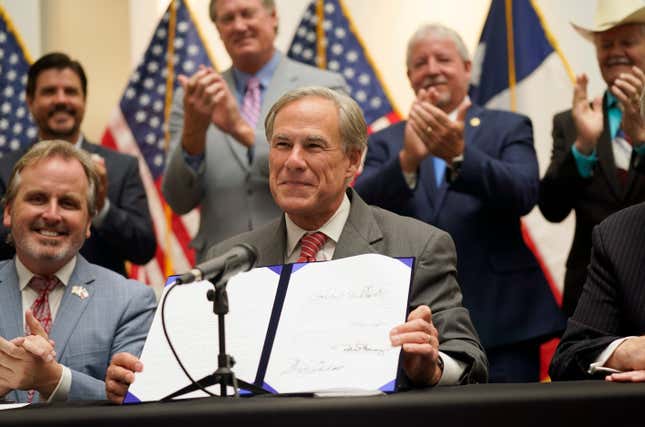
It seems that Texas Governor Greg Abbott recovered from his case of COVID-19 just fine and is back on that BS we all know him for.
Abbott signed the controversial voting restrictions bill, Senate Bill 1, into law on Tuesday, effectively ending months of legislative battles with state Democrats and making the voting process much harder for Texas residents. But before Abbott could even put his name on the dotted line, nearly two dozen organizations, Harris County and advocates filed lawsuits Friday naming Texas Republicans, including Abbott, and local elections officials in two separate challenges to the new law in federal court.
From the Washington Post:
One complaint, filed in San Antonio, lists 14 plaintiffs, including Texas Impact, a faith-based advocacy group. Executive Director Bee Moorhead said in a news release that the group was suing after having “prayed, protested, preached, and pushed, but at the end of the day, lawmakers have chosen a path that will lead to disenfranchisement.”
A second complaint was filed in Austin on behalf of five plaintiffs including the League of Women Voters of Texas, a nonpartisan group that encourages civic engagement, and REV UP Texas, which advocates for voters with disabilities.
“Litigation is always a last resort,” said Ryan Cox, an attorney at the Texas Civil Rights Project who represents the Austin plaintiffs. “Only when the legislature ignores federal law, ignores all the facts given to them by the communities that the bill affects — only then do we consider litigation.”
The two suits will go before U.S. District Judges Robert Pitman and Fred Biery who previously ruled in favor of expanding voter access during the pandemic, according to the Post.
Now that Texas GOP leaders have successfully passed this bill on their third attempt, Texas joins a growing number of Republican-led states, including Florida, Arizona, and Georgia, in passing restrictive voter and election rules. The Republican Party has been on a mission to stop the expansion of voter rights following what they claim to be mass voter fraud in the 2020 elections, despite there being no evidence of voter fraud.
The biggest concerns about the new law, according to the Texas Tribune, include that it directly attacks the voting initiatives that helped drive up voter numbers last year and creates barriers for voters with disabilities and communities of color.
Here’s what the law will do, according to the Tribune:
While SB 1 makes some changes that could expand access, namely increasing early voting hours in smaller, mostly Republican counties, the new law otherwise restricts how and when voters cast ballots. It specifically targets voting initiatives used by diverse, Democratic Harris County, the state’s most populous, by banning overnight early voting hours and drive-thru voting — both of which proved popular among voters of color last year.
The new law will also ratchet up voting-by-mail rules in a state where the option is already significantly limited, give partisan poll watchers increased autonomy inside polling places by granting them free movement and set new rules — and criminal penalties — for voter assistance. It also makes it a state jail felony for local election officials to proactively distribute applications for mail-in ballots, even if they are providing them to voters who automatically qualify to vote by mail or groups helping get out of the vote.
Texas Democrats are now calling on Congress to begin acting on voting rights legislation, including the John Lewis Voting Rights Act, which was passed by the House last month.
“With the deliberate barriers to voting created by this legislation and redistricting just around the corner, we need the U.S. Senate to act immediately on the John Lewis Voting Rights Act,” Texas House Democratic Caucus Chair Chris Turner said, according to the Post. “Our democracy depends on it.”
It’s unclear that any congressional action will affect the new rules, according to the Tribune. The law is set to go into effect in early December, just ahead of the 2022 elections.

